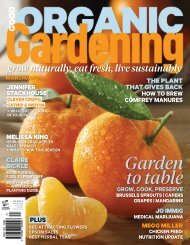1. Good Organic Gardening - January-February 2016
1. Good Organic Gardening - January-February 2016
1. Good Organic Gardening - January-February 2016
You also want an ePaper? Increase the reach of your titles
YUMPU automatically turns print PDFs into web optimized ePapers that Google loves.
GARDEN DIARY | Mid-summer<br />
Things to do in<br />
<strong>January</strong><br />
Summer in Australia is a season of extremes. Prepare for it to be very hot,<br />
wet, dry or windy, depending on climatic conditions. This is the season of<br />
floods, fires and cyclones, all of which take their toll on gardens<br />
By Jennifer Stackhouse<br />
Vegetables<br />
COOL & TEMPERATE<br />
Avoid the worst of the day’s heat by gardening<br />
in the cool of the early morning. Use this time<br />
to water and tend crops, check for pests,<br />
remove weeds and spot vegetables that are<br />
ready to harvest. On very hot days, shade<br />
crops to prevent sun damage. Repeat this<br />
inspection in the evening, paying particular<br />
attention to plants that need extra water.<br />
Make sure tomatoes are well watered to avoid<br />
blossom-end rot in fruit. If some crops are<br />
failing to form fruit — particularly cucurbits,<br />
including pumpkins, squash and zucchini — try<br />
hand pollination (transferring pollen from male<br />
flowers to receptive female flowers). In fruit fly<br />
zones, protect all soft vegies (such as tomatoes<br />
and capsicum) from fruit fly attack. These pests<br />
become more active as summer progresses.<br />
Use fruit fly baits or traps and, where possible,<br />
cover individual fruit with exclusion bags or<br />
nets. Regularly liquid-feed all edibles, especially<br />
leafy greens, and make new plantings of<br />
successful crops to keep the harvest coming.<br />
Keep weeds under control by hoeing between<br />
rows. Cover any bare soil with a thin layer of<br />
organic mulch to help deter weed growth.<br />
TROPICAL<br />
Harvest vegies while they are small and tender.<br />
In the heat and humidity of the wet season,<br />
crops such as zucchini and cucumber quickly<br />
over-mature. They become large, seedy and<br />
watery and are best fed to the chooks. Leafy<br />
crops, too, can become tough and bitter as<br />
they age, so always harvest them regularly.<br />
Replace mature crops with fresh sowings.<br />
Shade new plantings to protect them from both<br />
heat and heavy rains. Sweet corn, sunflowers<br />
and climbing crops on a trellis, such as Ceylon<br />
spinach, provide a natural source of shade for<br />
the vegie garden. Combat powdery mildew with<br />
regular applications of milk spray (one part<br />
whole milk to 10 parts water) or just pull out<br />
badly affected plants.<br />
Fruit<br />
COOL & TEMPERATE<br />
Mow or weed around fruit trees and deeply<br />
water trees, shrubs and vines at least once a<br />
week if rain is scarce, but reduce watering of<br />
fig trees. Feed most fruiting trees and shrubs,<br />
including apples, apricots and blueberries.<br />
Keep up fruit fly protection for still-ripening soft<br />
fruits, including raspberries. Use baits, traps and<br />
exclusion bags. Protect ripening fruit from birds.<br />
Use nets or reusable fruit baskets that snap<br />
over fruit clusters to protect crops against birds<br />
and bats. If using nets, use only white knitted<br />
nets that are less likely to snare birds, bats<br />
and reptiles. Stretch nets so they’re taut, avoid<br />
overly large nets that pool on the ground where<br />
they may trap small reptiles and regularly<br />
inspect nets to free any trapped animals.<br />
TROPICAL<br />
Keep harvesting summer fruit, including<br />
avocados, custard apples, mangoes, pawpaw<br />
and passionfruit. Hand-pollinate passionfruit<br />
flowers if fruit is slow to form. Check flowers<br />
regularly for ripe pollen to transfer to the<br />
sticky female part of the flower. Use a dry<br />
brush or cotton bud to transfer pollen. Bottle,<br />
freeze or dry excess crops. If fungal diseases<br />
are evident on fruit or foliage, apply a copperbased<br />
fungicide approved for organic gardens.<br />
Also, keep organic fruit fly baits fresh by<br />
regularly reapplying and protecting them<br />
from rain. Apply fertiliser to avocado, banana,<br />
If cucurbits are failing to<br />
fruit, try hand pollination<br />
custard apple, jackfruit, loquat, passionfruit<br />
and pawpaw, especially after periods of heavy<br />
rain, which leaches nutrients from the soil.<br />
Compost & soil<br />
COOL & TEMPERATE<br />
Chop up green prunings and seed-free<br />
weeds to add to compost heaps, layered with<br />
dry leaves. Compost is developing rapidly,<br />
so regularly use compost from the heap,<br />
spreading it over soil as natural mulch. This<br />
protects soils, keeps them cool and deters<br />
weed growth. Heaps should be moist but not<br />
too wet. If there are extended periods of heavy<br />
rain, cover heaps that are too wet. Conversely,<br />
if the weather is hot and dry, compost heaps<br />
can dry out and may need to be watered and<br />
turned. Keep worm farms in a cool location as<br />
hot spells can kill worms.<br />
TROPICAL<br />
Summer storms continue to leach nutrients<br />
from soils, so renew mulches or simply<br />
lay down chopped-up prunings, including<br />
chopped palm and fern fronds, to protect the<br />
soil. Apply fertilisers including potash to rapidly<br />
growing vegetables and fruiting crops. In<br />
fallow vegie beds, plant a green manure crop<br />
to add fertility to the soil in time for dry season<br />
planting, or cover soil with a layer of mulch.<br />
Use the cooler evenings to do vigorous<br />
work such as digging, spreading mulches or<br />
turning the compost heap.<br />
Shutterstock, Jana Holmer<br />
40 | <strong>Good</strong> <strong>Organic</strong> <strong>Gardening</strong>
















